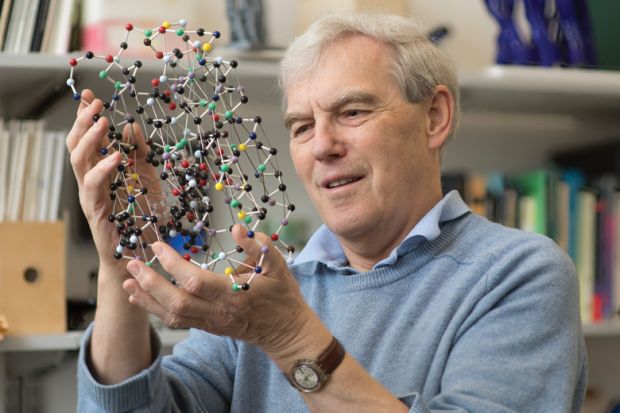Richard Henderson is a molecular biologist and biophysicist and group leader in the structural studies division at the Medical Research Council Laboratory of Molecular Biology, University of Cambridge. He is noted for his contributions to protein crystallography – a technique that uses X-rays to determine the structure of molecules. In May, he was announced as the winner of the Royal Society-awarded Copley Medal, the world’s oldest scientific prize. He was honoured for his work on imaging techniques that have enabled scientists to understand the arrangements of atoms in important biomolecules.
Where and when were you born?
Edinburgh, July 1945.
How has this shaped you?
Although born in the Edinburgh maternity hospital, I was brought up in the borders in Tweedmouth and then Newcastleton. I’m a Scottish country lad who benefited from the post-war academic selective system, Rab Butler’s 1944 Education Act. Many of my (intelligent) friends left school at 15 to work. My parents received a £50 grant from the government to encourage them to encourage me to stay on in the education system after age 15, which I did.
What is the significance of winning an award such as the Copley Medal?
It means that my area of work, structural biology, and the electron microscopy methods I have helped to develop have reached a wider audience and made a significant impact outside our immediate group of expert colleagues.
Former winners of the prize include Albert Einstein, Dorothy Hodgkin and Charles Darwin. Does it give you an extra element of pride to be following in the footsteps of some of history’s foremost academics?
The award certainly includes some giants of science, whether or not they were standing on the shoulders of other giants. Of course, I’m very proud to be associated with such previous winners. I was particularly pleased to note that the 2015 Copley Medal was awarded to Peter Higgs, whose lectures I took in the early 1960s in Edinburgh.
Do academics think about winning awards when undertaking research, or do they just focus on doing interesting and impactful projects?
Some may think about winning awards. I certainly know of several who have caught Nobel fever. However, others just enjoy their work. I think of my own research as an absorbing hobby that is intrinsically fascinating because it never repeats and is always new. I always felt that if you did something interesting and well, then at some point you would be well rewarded for doing exactly what you like.
Do you have concerns about the effect on science research funding were the UK to vote to leave the European Union?
Not so much about the availability of funding, since the same amount of money would be available under different systems. However, science is collaborative and needs a free and open exchange of ideas, methods and techniques. Close collaborations between European laboratories are definitely encouraged by UK membership of the EU. The EU needs the UK as much as we need Europe, and it is certainly true that the UK gets the lion’s share of EU funding, through merit and competition to fund the best proposals.
What has changed most in higher education in the past five to 10 years?
There is more emphasis on privately funded education in England, which has increased the barriers for social mobility and academic advancement. There is a greater faith in the state-funded system in Scotland.
What are the best and worst things about your job?
The best thing about being a research scientist is that you are (often) completely free to pursue what you judge to be the most productive research direction. This is a great recipe for revolutionary discovery. The worst thing is the increasing bureaucracy, but fortunately the UK is pretty sensible. There is a certain ruthlessness in the UK to get rid of petty and pointless rules and procedures while retaining those needed to minimise corrupt or nepotistic practices.
What keeps you awake at night?
Nothing. I need an alarm clock to wake me.
What do you do for fun?
Dog walking, kayaking, wine drinking and playing football with grandchildren. I’ve always been a movie fan.
What advice do you give to your students?
Find what interests and excites you and go for it. This is the same advice I would give my younger self.
What kind of undergraduate were you?
I definitely remember feeling lucky to be getting such a good education, yet having plenty of time for other activities. With a couple of friends, we spent a lot of time fixing up old cars. In our first year, three of us bought a 1948 Morris Eight Series E for £30, each contributing £10, and spent a couple of years driving all over Scotland.
What’s your most memorable moment at university?
Finding a mistake in one of the exam questions and having the boldness (or arrogance) to explain this in my answer. It made me realise that professors and lecturers were only human.
What is the biggest misconception about your field of study?
That it is a boring technique rather than a minor art form.
What project would you undertake if money were no issue?
In the UK, I would set up three or four geographically well-distributed research institutes, each built around a core of outstanding individuals. This is one aspect of what the Medical Research Council has done over many years so successfully.
What one thing would improve your working week?
Having a genie to deliver on “your every wish is my command”, but that would be unfair to the genie.
If you were the UK higher education minister for a day, what policy would you immediately introduce to the sector?
I would increase the salary of all teachers – primary, secondary and tertiary. It is the key to everything – education, education, education.
Appointments
Elizabeth Goyder, professor of public health at the University of Sheffield, has been appointed director of research at the Sheffield-based National Centre for Sport and Exercise Medicine. She will work with world-class researchers from both the University of Sheffield and Sheffield Hallam University to explore innovative and effective ways to help communities become more active. “A lack of physical activity can have a significant effect on our health and well-being, but we need to do more as a nation to help people become more active,” Professor Goyder said. “Sheffield’s two universities have a unique breadth of expertise that can support innovative research into how best to ensure that everyone benefits from more active lives.”
Chris Chang has been appointed pro vice-chancellor for global engagement at the University of Portsmouth. Mr Chang is currently pro vice-chancellor for corporate marketing, international and development services at Anglia Ruskin University. He has previously served as head of international at Manchester Metropolitan University before joining Brunel University London in a similar role. “I am delighted to be joining the University of Portsmouth at this exciting and challenging time in higher education,” he said. “The university is making great strides in its international outlook and reputation, as well as having a thriving international community.”
The Karolinska Institute has awarded honorary doctorates to two UK-based academics. Sir Richard Peto, professor of medical statistics and epidemiology, and Alimuddin Zumla, professor of infectious diseases and international health, at the University of Oxford and University College London, respectively, have been made honorary doctors of medicine. Robert Langer, institute professor at the Massachusetts Institute of Technology, has also been honoured in the same manner.
The Royal Northern College of Music has announced conductor Sir Mark Elder as a Companion of the College.
POSTSCRIPT:
Print headline: HE & me
Register to continue
Why register?
- Registration is free and only takes a moment
- Once registered, you can read 3 articles a month
- Sign up for our newsletter
Subscribe
Or subscribe for unlimited access to:
- Unlimited access to news, views, insights & reviews
- Digital editions
- Digital access to THE’s university and college rankings analysis
Already registered or a current subscriber?




